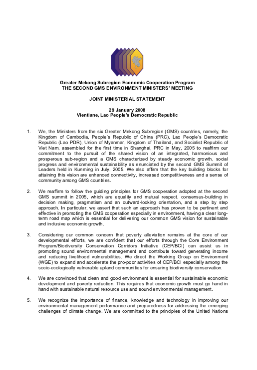
2nd GMS Environment Ministers' Meeting Joint Ministerial Statement
This joint statement was issued at the 2nd GMS Environment Ministers' Meeting on 29 January 2008 in Vientiane, Lao People’s Democratic Republic.
In the Greater Mekong Subregion, 200 million people in rural areas depend on their surrounding environment for food, water, energy, and income. Forests, wetlands, mangroves, farmlands, and other ecosystems account for between 20% and 55% of the subregion's wealth.
The Working Group on Environment (WGE) provides overall leadership and direction for the subregion's Core Environment Program.
Natural ecosystems – and the food, water, energy, and other vital elements they provide – lie at the heart of the development of the Greater Mekong Subregion. How these natural resources are protected, managed, and enhanced will determine the long-term sustainability of its environment and economic development.
Overexploitation of natural resources, pollution, vulnerability to climate change, and ever-increasing natural disasters are threatening these ecosystems. In addition, environmental degradation is posing risks to sustained long-term growth, and could cost a whopping $55 billion in foregone services over the next 25 years if left unchecked.
Unless there is better planning and management, the subregion’s resource-intensive development approach could lead to food shortages, price shocks, health hazards, and environmental damage that impact thousands of families and put businesses at risk.
The GMS Economic Cooperation Program Strategic Framework 2030 (GMS-2030) will focus on improving environmental sustainability and climate change resilience in the subregion. Environment and climate change challenges will be addressed through green technologies; protection of ecosystems and key ecological processes; climate resilience policies; and disaster-risk management, all of which will recognize the essential role that communities play as stewards of natural resources. A systematic effort will be made to mainstream climate change considerations into all GMS interventions, with a focus on energy efficiency, renewable energy, climate-smart landscapes, and sustainable waste management, particularly in terms of healthy ocean and river systems, and the tackling of plastic pollution. GMS-2030 was endorsed and adopted at the 7th GMS Summit of Leaders in September 2021. It aims to provide a new setting for the development of this subregion for the next decade.
The Core Environment Program Strategic Framework and Action Plan 2018-2022 was endorsed by GMS ministers at the 5th GMS Environment Ministers' Meeting in Chiang Mai, Thailand, held on 30 January – 1 February 2018. The 5-year environment strategy focuses on green technologies and sustainable infrastructure, natural resources and ecosystem services, and climate resilience and disaster risk management.
The GMS Climate Change and Environmental Sustainability Program (GMS CCESP), the third and current phase of the GMS Core Environment Program, supports environmental cooperation and green investments in the GMS. It covers six priority themes that were identified during the 24th Annual Meeting of the GMS WGE in 2019: (a) building climate and disaster resilience; (b) facilitating low carbon transitions; (c) promoting climate-smart landscapes; (d) enhancing environmental quality through pollution control and sustainable waste management; (e) deploying digital technologies for climate actions and environmental sustainability; and (f) financing low-carbon and climate-resilient infrastructure and technologies, including demonstrating climate and disaster risk financing instruments. The GMS CCESP builds on the achievements and lessons from the first two phases of the GMS Core Environment Program, and runs until 2025.
The GMS Core Environment Program was designed to help countries in the GMS meet the increasing demand for food, energy, water, and other natural resources, while at the same time ensuring that resources are available for future generations. This included balancing rapid growth with sustainable practices, and protecting vital water resources, controlling floods, preserving biodiversity and critical ecosystems, and mitigating the impacts of urban expansion.
Related
• GMS Core Environment Program website
• Greater Mekong Subregion Climate Change and Environmental Sustainability Program (Brochure)
Contact Persons
Focal Persons at the Asian Development Bank
Srinivasan Ancha
Climate Change, Resilience, and Environment Cluster
Climate Change and Sustainable Development Department
Mark Bezuijen
Agriculture, Food, Nature, and Rural Development Sector Office
Sectors Group
Other Concerned Staff & Consultants
Alvin Lopez
Agriculture, Food, Nature, and Rural Development Sector Office
Sectors Group
Criselda Rufino
Agriculture, Food, Nature, and Rural Development Sector Office
Sectors Group
Asadullah Sumbal
Regional Cooperation and Integration Unit
Southeast Asia Department
Rafaelita Jamon
Regional Cooperation and Integration Unit
Southeast Asia Department/GMS Secretariat
Send inquiries to GMS SAFSP Secretariat and GMS Secretariat.

This joint statement was issued at the 2nd GMS Environment Ministers' Meeting on 29 January 2008 in Vientiane, Lao People’s Democratic Republic.
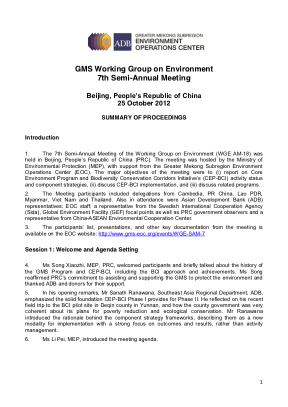
The GMS Working Group on Environment 2nd Semi-Annual Meeting (WGE SAM-2) was held on 28 November 2007 via videoconference at ADB resident missions in Cambodia, PRC, Lao PDR, Thailand, Viet Nam and ADB Headquarters as the host. WGE representatives from Myanmar extended their apologized for not being able to attend the meeting. The participants list is attached as Appendix 1. It was recognized that it was the first time videoconferencing was tried for a WGE meeting and some basic meeting rules were established to enable a smooth discussion.
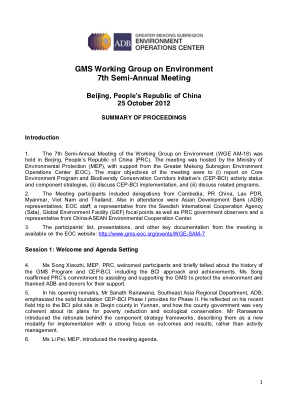
This is the summary of proceedings from the 13th Annual Meeting of the Working Group on Environment (WGE AM-13) held on 13 -15 June 2007 in Guilin, Guangxi Province, People’s Republic of China.
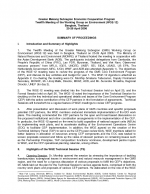
The Twelfth Meeting of the Greater Mekong Subregion (GMS) Working Group on Environment (WGE-12) was held in Bangkok, Thailand on 25-26 April 2006. The Ministry of Natural Resources and Environment (MONRE) of Thailand hosted the meeting in cooperation with the Asian Development Bank (ADB). The participants included delegations from Cambodia, the People's Republic of China (PRC), Lao PDR, Myanmar, Thailand, and Viet Nam. Observers/resource persons from MFLU, IGES, UNCRD, UNEP, SEI, SIDA, USAID, US EPA, The Netherlands Government, MRC, IUCN, WWF, and ADB also attended.
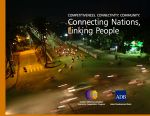
This publication outlines the GMS Economic Cooperation Program (GMS Program) which was initiated in 1992 with the support of ADB. It aims to promote economic cooperation among Cambodia, People's Republic of China (PRC), Lao People's Democratic Republic (Lao PDR), Myanmar, Thailand, and Viet Nam.
The GMS Program covers nine priority sectors: transportation, telecommunications, energy, environment, human resource development, trade, investment, tourism, and agriculture.
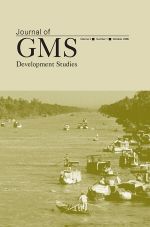
The fledgling Greater Mekong Subregion (GMS) Journal for Development Studies, published under the auspices of the Phnom Penh Plan (PPP) for Development Management, moves a step ahead with the second issue. In what might be considered as "ascending steps," GMS scholarship is moving forward, slowly but surely. The PPP's commitment is to ensure that we continue to make strides towards our goal of bridging the gap between research and capacity building and to propagate the gospel of balanced socioeconomic development in the GMS.
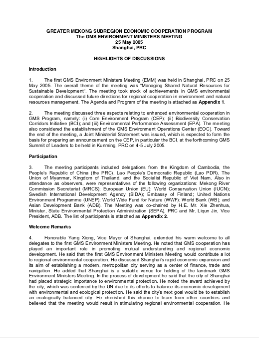
These are the conference proceedings from the first Greater Mekong Subregion Environment Ministers Meeting held in Shanghai in the People's Republic of China on 25 May 2005.
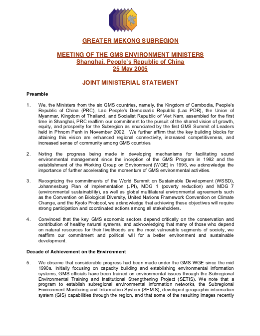
This is the joint statement from the First Greater Mekong Subregion Environment Ministers' Meeting in Shanghai in the People's Republic of China on 25 May 2005.
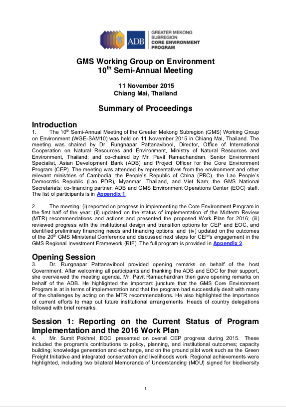
These are the summary of proceedings from the 11th Meeting of the Subregional Working Group on Environment (WGE-11) held in Siem Reap, Cambodia on 15-16 March 2005,
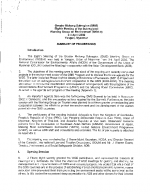
This publication summarizes the outcome of the Twelfth Meeting of the Working Group on Environment (WGE-8) held in Yangon, Myanmar on 3-4 April 2002.